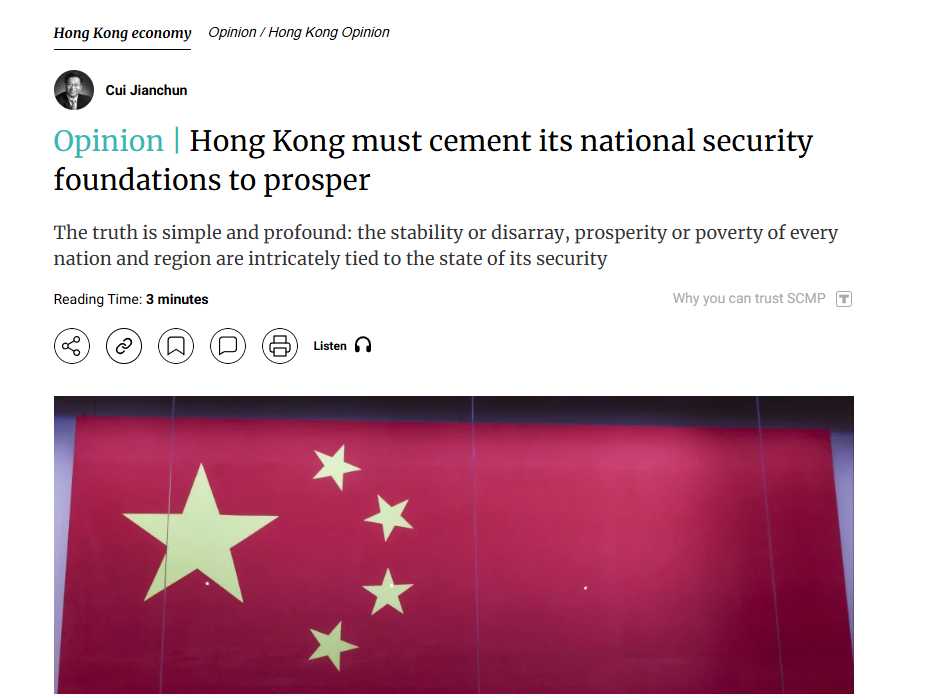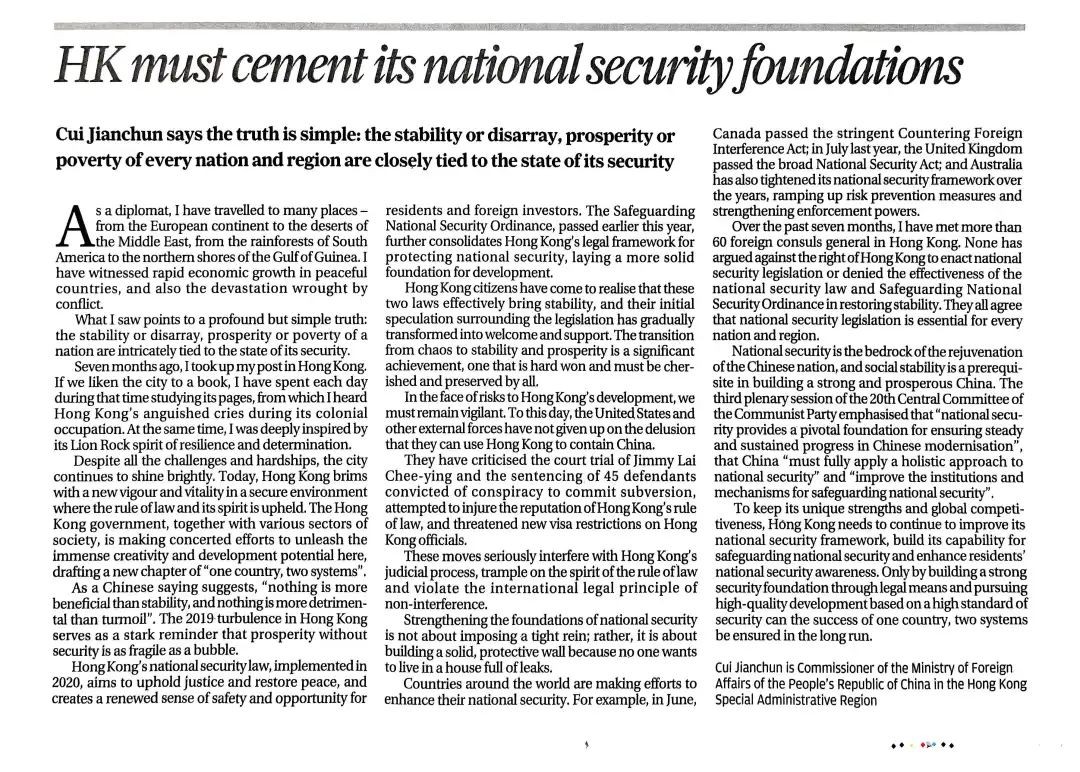崔建春特派员在《南华早报》发表署名文章《筑牢安全底线 护航香港发展》
香港新闻网12月3日电 12月3日,外交部驻香港特派员公署特派员崔建春,在《南华早报》发表题为《筑牢安全底线 护航香港发展》的英文署名文章,阐述发展与安全的辩证统一关系,强调国安立法是香港繁荣发展的重要保障和基本前提,坚决驳斥外部势力对特区国安案件审理和法治营商环境的不实指责,提醒香港社会警惕外部干预风险、守牢安全底线,坚持以高水平安全护航香港高质量发展。文章3日亦在该报网页版刊登。全文如下:
从欧洲大陆到中东沙漠,从南美雨林到几内亚湾北岸,作为一名外交官,我走过世界上很多地方,既见证了自立自强造就的经济腾飞,也目睹过动乱冲突导致的满目疮痍,深感贫瘠的土地上长不成参天的大树,连天的烽火中结不出发展的硕果,治与乱、兴与衰全系于国家安危。
过去半年多来,我一直在认真研读香港这本书,听到了她百年殖民、游子难归的悲愤怒吼,赞叹于她自强不息、顽强拼搏的传奇精神。维多利亚港两岸,历经百年风雨,依旧灯火璀璨。浴火重生后的香港,在安全与法治环境中焕发出蓬勃生机,特区政府和社会各界众志成城、开拓进取,以港为家、倚港兴业、爱国护港,共同激发香港社会蕴藏的巨大创造力和发展活力,奋力书写“一国两制”下新的香江传奇。


利莫大于治,害莫大于乱。2019年发生在香港的乱局告诉我们,没有安全保障的繁荣好比镜花水月,一触即碎。香港国安法惩恶扬善、法安香江,让市民和外国投资者重享安居乐业。《维护国家安全条例》进一步筑牢特区维护国家安全的法律屏障,夯实香港发展的安全根基。香港市民真切地感受到,国安立法是维护香港繁荣稳定的定海神针,从对国安立法的忐忑、猜测、观望到接纳、欢迎、支持,国家安全意识已逐渐融入香港社会肌理。香港由乱到治、由治及兴的良好局面来之不易,是全民共筑维护国家安全坚强防线的宝贵成果,必须珍之重之惜之恒之。
于安思危,于治忧乱。国安风险无处不在,忧患意识片刻不停。在香港社会全力拼经济、谋发展的同时,我们仍然不能掉以轻心,必须时刻警觉各种风险与挑战。时至今日,以美国为首的外部势力仍未放弃“以港遏华”的幻想,公然对香港特区法院有关“黎智英案”的审理和“串谋颠覆国家政权罪案”的量刑判决横加指责,诋毁抹黑香港法治声誉,叫嚣施加新的签证限制,干预特区司法,干涉香港事务,践踏法治精神,违背不干涉内政等国际法原则。应对变乱交织国际形势、防范重大风险挑战、营造安全稳定发展环境,需要我们共同努力,守牢底线、防患未然。
筑牢国家安全屏障不是给自己戴上“紧箍咒”,而是砌牢“防护墙”,没有人愿意住在“四处透风”的“房子”里。环顾世界,各国都在下大力气完善国家安全立法。加拿大今年6月通过了刑罚严苛的《反外国干预法》,英国去年7月制定了适用范围广泛的《国家安全法》,澳大利亚近年来更是立法、修法并举,不断织密国安法网,升级风险防控手段,加强安全执法授权。到任半年多来,我会见了60多位外国驻港总领事,没有一位总领事说香港国安法、国安条例不该立,没有一位总领事否认国安立法止暴制乱的显著成效,他们都同意国安立法是每一个国家、每一个地方维护生存发展的必须之举。
国家安全是民族复兴的根基,社会稳定是国家强盛的前提。中国共产党二十届三中全会强调,国家安全是中国式现代化行稳致远的重要基础,必须全面贯彻总体国家安全观,完善维护国家安全体制机制。加快推进香港由治及兴进程、巩固提升香港独特地位优势和国际竞争力,需要不断完善特区维护国家安全制度体系,强化维护国家安全能力建设,培育全民维护国家安全意识责任,以法治夯实长治久安的制度根基,以高水平安全护航高质量发展,推动“一国两制”航船行稳致远!
Hong Kong must Cement its National Security Foundations to Prosper
Cui Jianchun says the truth is simple: the stability or disarray, prosperity or poverty of every nation and region are closely tied to the state of its security.
As a diplomat, I have travelled to many places – from the European continent to the deserts of the Middle East, from the rainforests of South America to the northern shores of the Gulf of Guinea. I have witnessed rapid economic growth in peaceful countries, and also the devastation wrought by conflict.
What I saw points to a profound but simple truth: the stability or disarray, prosperity or poverty of a nation are intricately tied to the state of its security.
Seven months ago, I took up my post in Hong Kong. If we liken the city to a book, I have spent each day during that time studying its pages, from which I heard Hong Kong’s anguished cries during its colonial occupation. At the same time, I was deeply inspired by its Lion Rock spirit of resilience and determination.
Despite all the challenges and hardships, the city continues to shine brightly. Today, Hong Kong brims with a new vigour and vitality in a secure environment where the rule of law and its spirit is upheld. The Hong Kong government, together with various sectors of society, is making concerted efforts to unleash the immense creativity and development potential here, drafting a new chapter of “one country, two systems”.
As a Chinese saying suggests, “nothing is more beneficial than stability, and nothing is more detrimental than turmoil”. The 2019 turbulence in Hong Kong serves as a stark reminder that prosperity without security is as fragile as a bubble.
Hong Kong’s national security law, implemented in 2020, aims to uphold justice and restore peace, and creates a renewed sense of safety and opportunity for residents and foreign investors. The Safeguarding National Security Ordinance, passed earlier this year, further consolidates Hong Kong’s legal framework for protecting national security, laying a more solid foundation for development.
Hong Kong citizens have come to realise that these two laws effectively bring stability, and their initial speculation surrounding the legislation has gradually transformed into welcome and support. The transition from chaos to stability and prosperity is a significant achievement, one that is hard won and must be cherished and preserved by all.
In the face of risks to Hong Kong’s development, we must remain vigilant. To this day, the United States and other external forces have not given up on the delusion that they can use Hong Kong to contain China.
They have criticised the court trial of Jimmy Lai Chee-ying and the sentencing of 45 defendants convicted of conspiracy to commit subversion, attempted to injure the reputation of Hong Kong’s rule of law, and threatened new visa restrictions on Hong Kong officials.
These moves seriously interfere with Hong Kong’s judicial process, trample on the spirit of the rule of law and violate the international legal principle of non-interference.
Strengthening the foundations of national security is not about imposing a tight rein; rather, it is about building a solid, protective wall because no one wants to live in a house full of leaks.
Countries around the world are making efforts to enhance their national security. For example, in June, Canada passed the stringent Countering Foreign Interference Act; in July last year, the United Kingdom passed the broad National Security Act; and Australia has also tightened its national security framework over the years, ramping up risk prevention measures and strengthening enforcement powers.
Over the past seven months, I have met more than 60 foreign consuls general in Hong Kong. None has argued against the right of Hong Kong to enact national security legislation or denied the effectiveness of the national security law and Safeguarding National Security Ordinance in restoring stability. They all agree that national security legislation is essential for every nation and region.
National security is the bedrock of the rejuvenation of the Chinese nation, and social stability is a prerequisite in building a strong and prosperous China. The third plenary session of the 20th Central Committee of the Communist Party emphasised that “national security provides a pivotal foundation for ensuring steady and sustained progress in Chinese modernisation”, that China “must fully apply a holistic approach to national security” and “improve the institutions and mechanisms for safeguarding national security”.
To keep its unique strengths and global competitiveness, Hong Kong needs to continue to improve its national security framework, build its capability for safeguarding national security and enhance residents’ national security awareness. Only by building a strong security foundation through legal means and pursuing high-quality development based on a high standard of security can the success of one country, two systems be ensured in the long run.(完)
